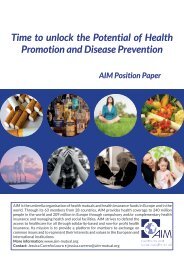Exploring patient participation in reducing health-care-related safety risks
Exploring patient participation in reducing health-care-related safety risks
Exploring patient participation in reducing health-care-related safety risks
You also want an ePaper? Increase the reach of your titles
YUMPU automatically turns print PDFs into web optimized ePapers that Google loves.
<strong>Explor<strong>in</strong>g</strong> <strong>patient</strong> <strong>participation</strong> <strong>in</strong> reduc<strong>in</strong>g <strong>health</strong>-<strong>care</strong>-<strong>related</strong> <strong>safety</strong> <strong>risks</strong><br />
104<br />
The ERS developed a study <strong>in</strong> 2007 that aimed to describe the national state of affairs<br />
concern<strong>in</strong>g the application of <strong>in</strong>formed consent at operational level. Public and private<br />
entities were requested to send their <strong>in</strong>formed consent forms as part of the study,<br />
and 120 valid answers were received (41). The results showed that the application of<br />
<strong>in</strong>formed consent was heterogeneous among the different <strong>health</strong> <strong>care</strong> units and, <strong>in</strong> some<br />
circumstances, even with<strong>in</strong> the same unit. Moreover, some <strong>health</strong> <strong>care</strong> units did not even<br />
have policies <strong>related</strong> to <strong>in</strong>formed consent (41).<br />
In a study of <strong>in</strong>formed consent quality carried out <strong>in</strong> 2009 <strong>in</strong> the surgical unit of the<br />
Porto Hospital Centre, Santo Antonio Hospital, 63.5% of respondent <strong>patient</strong>s underwent<br />
elective surgery. Of these, 73.7% had a low level of education, 51.1% were men and 62%<br />
were retired. The authors reported that 86.1% of <strong>patient</strong>s undergo<strong>in</strong>g surgery received<br />
<strong>in</strong>formation about surgery-<strong>related</strong> issues; this <strong>in</strong>formation was provided by the surgeon<br />
<strong>in</strong> 62.8% of cases. Just over 50% received the <strong>in</strong>formation m<strong>in</strong>utes, hours or days before<br />
the surgery, while 49.2% received it weeks or months before. Just over 30% did not<br />
receive <strong>in</strong>formation about other treatment options but 81.4% considered that they had<br />
received sufficient <strong>in</strong>formation. Relationships with the surgeon and <strong>participation</strong> <strong>in</strong> SDM<br />
<strong>in</strong>dependently <strong>in</strong>fluenced each <strong>patient</strong>’s satisfaction with the <strong>in</strong>formed consent process (79).<br />
Patient engagement and surgical <strong>safety</strong><br />
Elective surgery gives the <strong>patient</strong> the opportunity to improve the quality of <strong>care</strong> received<br />
by understand<strong>in</strong>g treatment options and work<strong>in</strong>g with HCWs to make the surgery as<br />
safe as possible (80). Surgery consists mostly of elective procedures and most of the<br />
available data reflect this. The majority of <strong>patient</strong>s <strong>in</strong> the Porto study mentioned above<br />
did not know the mean<strong>in</strong>g of <strong>in</strong>formed consent, even though all had given their <strong>in</strong>formed<br />
consent before surgical procedures or important diagnostic tests. Patient gender, literacy<br />
and previous hospitalizations seemed to exert an <strong>in</strong>fluence on the results (41).<br />
Accord<strong>in</strong>g to the 2006 Eurobarometer survey of medical errors, 18% of Europeans<br />
and 16% of Portuguese citizens had experienced a serious medical error <strong>in</strong> a hospital.<br />
Most Portuguese citizens (66%) thought it was unlikely that a hospital <strong>patient</strong> could<br />
have any <strong>in</strong>fluence on avoid<strong>in</strong>g a medical error and only 23% believed that a hospital<br />
<strong>patient</strong> could actually help <strong>in</strong> their prevention (81). Increased awareness is nevertheless<br />
perceptible <strong>in</strong> the 2010 Eurobarometer survey of <strong>patient</strong> <strong>safety</strong> and quality of <strong>health</strong><br />
<strong>care</strong>, <strong>in</strong> which 50% of Europeans and 64% of Portuguese believed that be<strong>in</strong>g harmed by<br />
hospital <strong>health</strong> <strong>care</strong> was “likely”. When asked to state their views of the likelihood of<br />
occurrence of specific adverse events, 67% felt that HAIs were likely to occur and 58%<br />
saw a potential for surgical errors (82).<br />
The 2010 Eurobarometer survey revealed that 17% of European <strong>health</strong> consumers who<br />
reported that they or a member of their family had undergone surgery <strong>in</strong> the previous<br />
three years stated that written consent was never obta<strong>in</strong>ed. In Portugal, 24% stated that<br />
written consent was never, and 16% only sometimes, obta<strong>in</strong>ed (82).<br />
The WHO Second Global Patient Safety Challenge, “Safe Surgery Saves Lives”,<br />
recognizes the importance of the <strong>patient</strong> undergo<strong>in</strong>g surgery as a member of the team<br />
(9). Dur<strong>in</strong>g the treatment process, the surgical team “contributes <strong>in</strong>formation about



